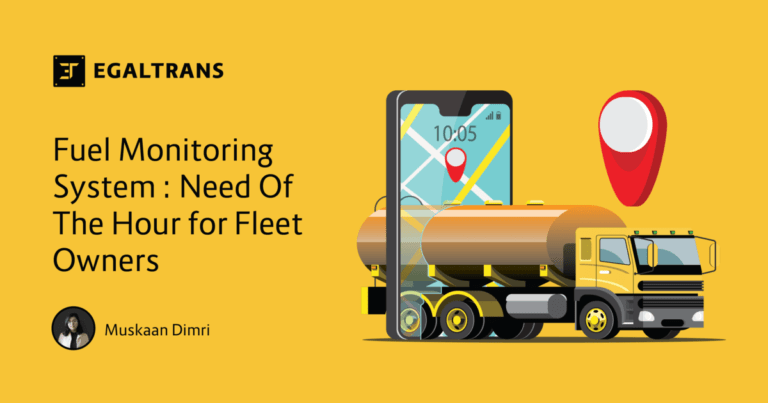With plenty of new GPS tracking systems being developed everyday, how can one make the best buy for their fleet efficiency? If you are someone who wants to know more about GPS devices in order to grow your fleet, you shouldn’t miss out reading this article till the end!!
Woke up in the middle of the night, wondering about your truck’s current location?
Or your driver’s calling for help and you don’t know their exact location?
All of these could create challenges for fleet owners and managers. A GPS tracking solution proposes a solution to these. Though choosing the right solution could be tricky. Would the solution work flawlessly? What kind of data connection would it need, 2G, 3G or 4G? Does it come with a SoS button? These are some very basic questions you should ask while choosing the right vendor for a fleet tracking solution.
Equipping your trucks with the right GPS tracking devices can give you critical insight into your fleet’s performance, and you can use that information to optimize your operations. When choosing a tracking device, be sure to communicate exactly what you want from your fleet tracker during the purchase process.
What is GPS Tracking and Why Should You use it?
Global Positioning System (GPS) tracks vehicles in your fleet. The hardware sends updates and data to the software. The software then takes over and acts as a hub for storing all the information you need. GPS fleet tracking includes hardware and software that helps your company’s vehicles operate efficiently and drivers to drive safely and responsibly. With these and other features, GPS fleet tracking can boost your business by providing critical data and reducing costs. When managing fleet drivers, the goal is to ensure driver safety while reducing effort and improving customer satisfaction.
Tips for Choosing the Right GPS Fleet Tracking System
1. Choose between Periodic Update or Real-Time Tracking
The first and the foremost decision before choosing a GPS tracking system is to figure out whether your fleet requires periodic tracking or real-time tracking.
- Real time tracking system is where the trackers send regular information of location and vehicle status to the fleet owners. Usually transportation businesses who want to keep a close eye on their trucks in order to obtain in-depth analytics of the trucks use real time tracking devices.
- On the other hand periodic tracking sends information to the fleet managers at a specific interval of time (per day updates or weekly updates). Companies that invest less on tracking and want to save big on their truck’s battery generally choose periodic tracking as a method of GPS tracking system.
2. Make sure your tracker has these key features
The right kind of GPS tracker should be well equipped with the latest features which can make work easier for fleet owners and the drivers too.
Some key features are:
- Alert Systems: GPS tracking devices paired with alert systems enable relevant user information to be sent via email or texts which reports essential truck activity for eg, the alert system will notify if the driver is found to be idling or driving fast. Additionally, you may also want geofencing capabilities to get alerts when your vehicles enter a pre-defined territory. Having SoS alert options will provide safety to your drivers, so they can notify you whenever they are in need of help.
- Remote-locking: To prevent vehicle theft you would need a remote-locking mechanism to turn off and lock your trucks from anywhere.
- Fuel Card Integration: A fuel card integrated GPS tracking system provides information about fuel expenditure and also helps truck drivers to follow predefined policies.
- Cloud-based Interface: Cloud based GPS trackers offer routing and navigation features. For eg, it will help in providing directions to the truck drivers and also help in assisting them to make essential stops for shipments whenever required.
3. Know your assets
Find out why you need GPS to manage your trucks and fleets, and what it can do for your business. Start collecting data and analyze areas that need development. Are you looking for features to help you monitor vehicles, secure fleets, reduce fuel consumption, prevent breakdowns, improve customer service, or manage remote workers? For example, one fleet owner might want to track their truck location which is doing about 50 shipments per day, the other fleet owner might want to track the conditions of truck parts or even fuel tracking.
4. Ease of Use for greater efficiency
The next factor to consider while installing GPS tracking software is to see how difficult the software is to use. Some companies offer easy-to-use dashboards that fleet managers can use to access all telematics data for their fleets with little training. External training seminars and webinars to learn more about new solutions are given to fleet managers. Dispatchers, maintenance staff, drivers and other members of the team may also need to take time off work to learn about features. Look for simple and intuitive options. Ideally drivers and other employees should be able to use the program with minimal training.
5. Efficient technical support
A good vehicle GPS tracking system is backed by a strong customer support team. Providers can and should help implement GPS trackers. This allows businesses to get the most out of it and optimize vehicle performance. They should also be able to assist with troubleshooting if necessary. Before making any decision on installation of a GPS tracking system, verify whether or not it is aided with an efficient customer support team in order to debug any potential issues in the hardware or software.
GPS tracking can revolutionize any truck transportation business. This will be helpful in narrowing down your options and choosing the best GPS tracking system which will be useful for driver productivity, safety, industry-specific reports, and more. Consider the above information and choose the right solution for your needs.






[…] in fleet management is the widespread adoption of telematics. Telematics systems, utilizing GPS technology and sensors, provide real-time data on vehicle location, speed, fuel consumption, and engine […]